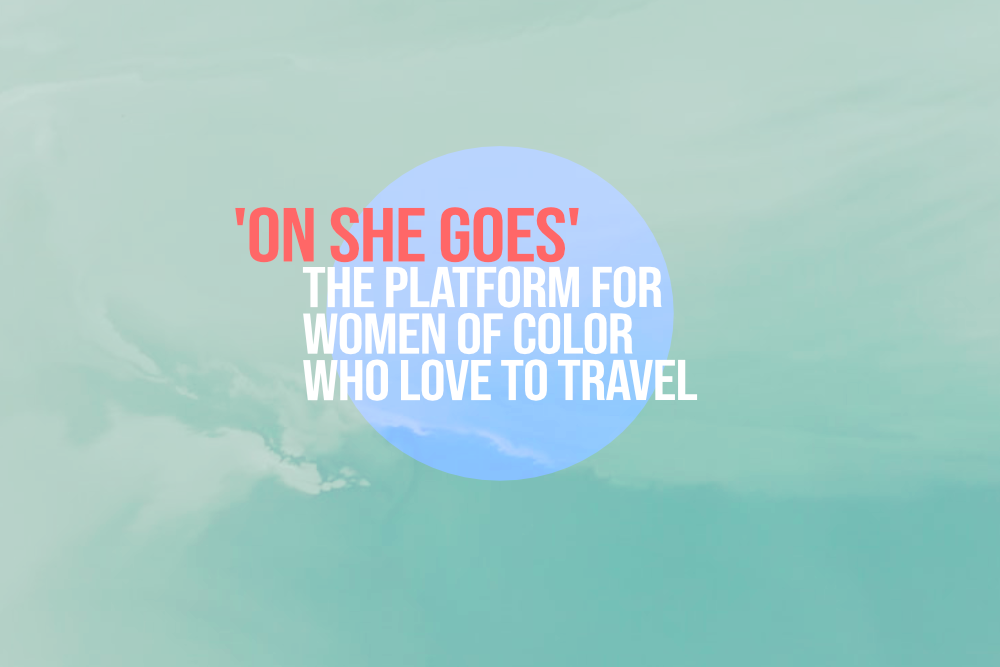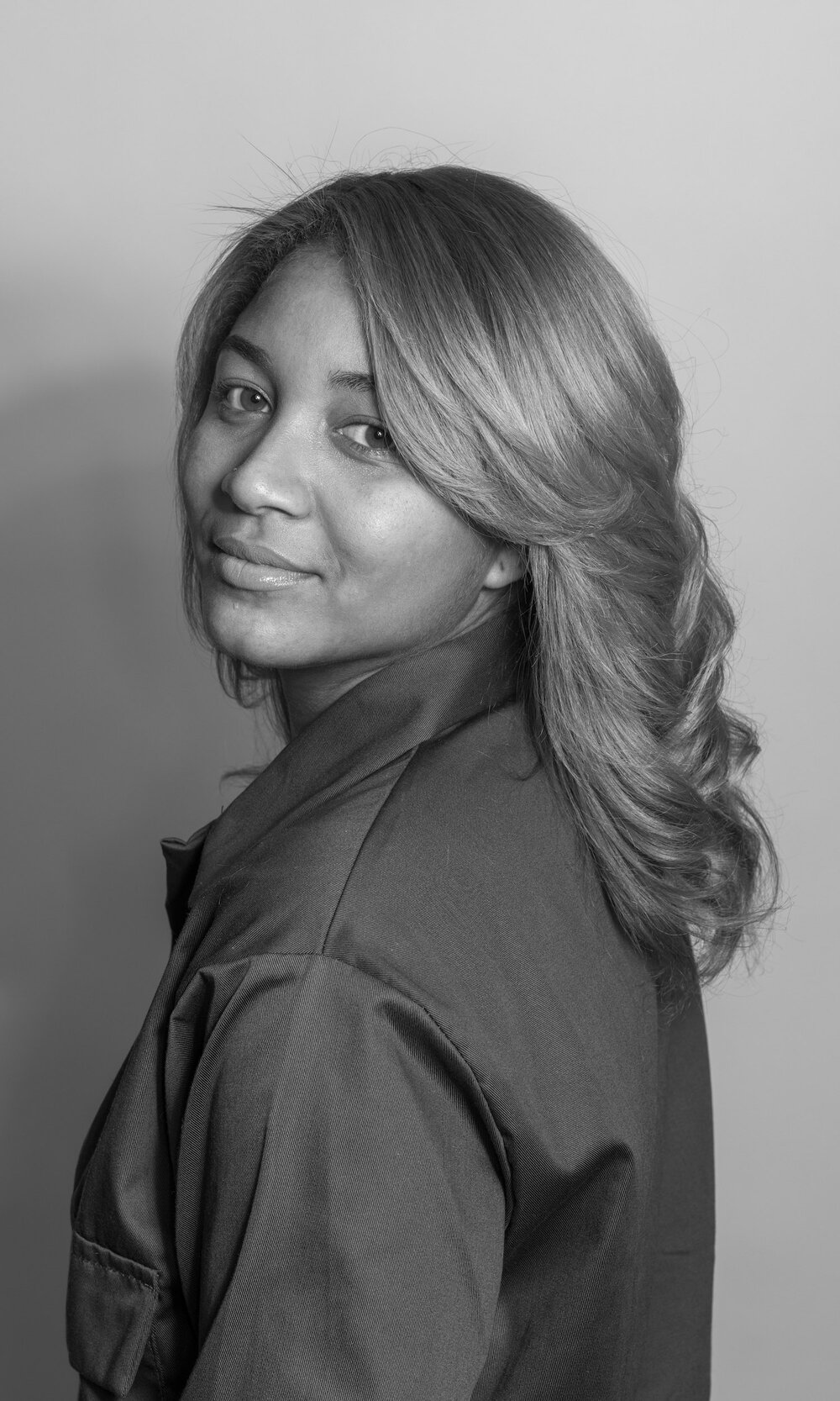
A pioneer of content, Serita Wesley is one of the founders of popular travel podcast On She Goes. Unlike typical travel media or podcasts, On She Goes is a platform bringing important yet traditionally overlooked stories to center stage. The heart of the show is empowering women and non-binary people of color to experience, visit and explore new spaces.
On She Goes was originally created through Wieden+Kennedy’s publishing department, a newly formed department at the time. The founders’ backgrounds stretched from publishing to strategy. And while the podcast began as a work project, it quickly became something much more personal — the podcast’s essential structure compiled of stories telling of their own personal experiences and stories.
“We approached it with the question of ‘how can we be inspired by this to actually travel more,’ along with thinking of ways we could bring our own questions and experiences forward,” says Wesley.
We sat down with Wesley to learn more about her innovative podcast. Read more below then subscribe to her ongoing podcast On She Goes.

On She Goes founder, Serita Wesley
Marmoset: Can you tell me a little bit about the origins of On She Goes and why you were inspired to create it?
Wesley: When we were starting On She Goes, we were trying to figure out what it was going to be. Is it going to be a podcast? Is it going to be a platform? Is it going to be video or social media? Is it going to be everything? And we did kind of ended up with everything.
We were working with Pineapple Street Media and Aminatou Sow who is the host of Call Your Girlfriend and we were trying to figure out how we can possibly do something or make something that is informative, educational but also entertaining. And so I had a lot of these really cool ideas and some really cool people in mind to interview.
And because Aminatou had all these really awesome friends in the community and in the travel space, we started with her then found that people were really interested in the firsthand perspective. Basically hearing stories about what we’ve done and what other people have done. So we started speaking from our own perspectives, interviewing people who we deemed as experts or people with certain experiences that we wanted to highlight.
M: There’s this recurring theme in the podcast of all-welcoming and empowerment for women of color to step into new kinds of spaces. How does that stretch over the content you’re currently creating?
Wesley: From the beginning we wanted to have content our audience could relate to. So even going back to the first episode of “We Belong Here” where it was several people talking about what that means to them, but also when it comes to travel and getting out there, being fearless and having the same opportunities everybody else gets. And that even though travel media is so white male and affluent, it’s for everybody — we’ve always tried to enforce that idea.
Even to this day, we’ve kind of morphed into this thing of travel but also lifestyle representation and etc. So we also get to highlight women of color who are doing extraordinary things that you mostly only see white men doing. Like we just interviewed a black female comedian the other day who was headlining the All Jane Festival which was really cool. We’ve also interviewed Georgina Miranda, the first woman of color to scale Kilimanjaro, went to Antarctica and has done so many incredible things in the outdoors.
It really ranges, we want to give women of color an opportunity to have their voices heard. Like we interviewed Alisha Ramos of Girls’ Night In, a space for women who are more introverted. And that’s a huge thing with travel, you know if you wanted to travel but want to be left the hell alone. I think we’re fully embracing the idea of a platform and giving people a place to have their voices heard — finding people of color, as well as non-binary people of color too.
>
““Condé Nast Traveler isn’t talking about being a woman of color who is queer and coming out to your family back home, you know what I mean? It’s super specific and they’re stories that can help a lot of people — give a lot of perspective and advise youth.””
M: Is there a particular episode that you’re particularly proud to share with your listeners?
Wesley: One of our favorite episodes is the one that we did on transracial adoption. We also had a story from a woman named Casey Lawrence on being adopted from Vietnam and then returning to Vietnam to find her birth parents. And that was a subscriber submission and it was really great and very inspirational, we got a lot of emails and feedback from people saying, “Wow, I’m so glad I got to share this.” We also had a Rebecca Hudson who is a transracial adoptee and consultant for people who are looking to adopt children of other races and transracial, transnational adoption.
It’s such an interesting topic and a lot of people weren’t talking about it on a larger platform, so we ended up getting a lot of people talking. That’s probably the episode we have the most comments on. We had a lot of people coming to us saying, “This really helped me and I don’t find this anywhere else.”
M: Seeing this kind of impact on your listeners, can you share a little bit about what your hopes would be for those who experience your content? What do you hope they’ll take away?
Wesley: Even with our stories that we feature on our site, our editorial stories, that’s super important because you don’t get to have content like that anywhere else. Condé Nast Traveler isn’t talking about being a woman of color who is queer and coming out to your family back home, you know what I mean? It’s super specific and they’re stories that can help a lot of people — give a lot of perspective and advise youth.
M: Looking back on where you started, how do you think On She Goes has evolved?
Wesley: I think it’s evolved way beyond what I thought it would already, to be honest. I had no idea it was going be as popular as it did. I literally have people who listen to it and then are like, “Oh my friend sent me your podcast randomly. And I was like, ‘Oh that’s my friend. Serita!’ — it just kind of blew up way more than I was expecting and it’s a little intimidating because I’m like, damn I guess we have to keep this going.
M: And looking ahead, how would you like to see the podcast evolve?
Wesley: I really hope to be able to reach as many people as possible. It’d really cool to open it up to the public. I loved last year when we held submissions for storytelling and we were able to say, ‘Hey send in your stories if you’re interested in being featured and we’ll figure out a way to get you recorded and help in that way.’ That’s what I really love doing since especially when it comes to travel, everyone has something to say. I think that’s really awesome to help people be heard who wouldn’t usually have that opportunity. So hopefully we can continue doing that and the podcast can evolve in that kind of space.
M: We love how you’re always looking for ways to share your platform. How does your team approach selecting the content to create?
Wesley: We always like to find out what’s currently happening and what’s new that we’re not abreast of, you know. We try to stay away from like current events because thing sucks so badly, but then again, we always want to make sure we’re tackling different perspectives and we’re speaking to all the audiences we possibly can. I think we can definitely do better. I’m trying to reach out to like the LGBTQIA audience and making sure their voices are heard too. A lot of that stuff, we’re trying to make sure we’re covering everybody’s bases as much as we possibly can.
M: What’s a destination were you not expecting to like but did?
Wesley: New Mexico. I was not expecting to be into that place at all. I’ve watched Breaking Bad and I just thought, ah I don’t know about this. It just looks dry and I wasn’t super stoked about it. But the Airbnb we got was nice and I was going along as a team player, but it was actually really beautiful. I saw some of the best sunsets, sunrises and stars that I’ve ever seen in my life there. And I actually kind of like the Southwestern style more than I thought I would.
M: Can you share the top three destinations on your bucket list?
Wesley: I want to go to the Amalfi Coast in Italy. I also want to go to Tokyo and really want to go to Kenya. Those are my top three ‘out of the country’ destinations. It’s mostly visuals that drive me to those places.
M: As an experienced traveler, what would be one travel tip you’d pass along?
Wesley: If you can afford it, get premium class. Honestly, at this point I struggle when I don’t have it, which makes me feel kind of weird because it’s not like I’m a jet-setter. But I think if you can afford it, I would definitely get premium class.
Also, on the other side of that though too, my other travel tip is if you’re on personal travel, pack a lunch or pack yourself some snacks — because it gets expensive and airplane food is not delicious. Let’s be honest, you know they got to do something to it to make it stay fresh and I don’t know what that something is and I’m good on that.
A special thanks to Serita Wesley for sharing her story with us. Subscribe to On She Goes here to tune into new episodes.
